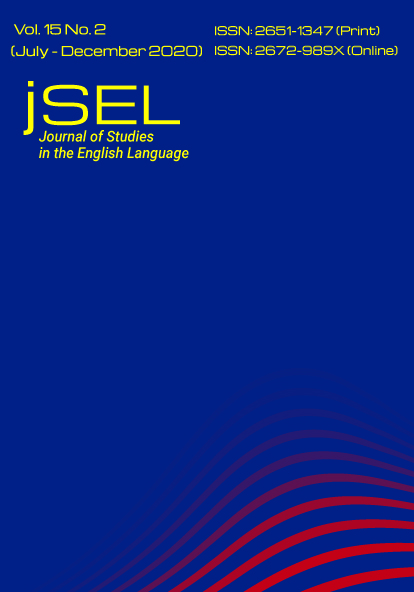Systematicity of L1 Thai Learners’ L2 English Interlanguage of ‘Wish-Clauses’
Main Article Content
Abstract
The current study aimed to investigate the production of L2 English ‘wish-clauses’ by L1 Thai learners, based on the Interlanguage Hypothesis (Selinker, 1972, 1992). It was hypothesized that L1 Thai learners showed systematicity in their interlanguage (IL) in the use of three types of ‘wish-clauses’ and that their IL was shaped by language transfer and transfer of training, which are among the psychological processes of IL construction. A Cloze Test and a Situation Task were administered to 30 L1 Thai undergraduate students, divided equally into two groups: an intermediate group and an advanced group. The results conformed to the hypotheses in that Thai learners of both proficiency levels seemed to exhibit systematicity in the production of all types of English ‘wish-clauses’ in both tasks. The systematicity was assumed to be influenced by language transfer, in combination with transfer of training. The results of the study are expected to shed light on the characteristics of English IL of ‘wish- clauses’ among L1 Thai learners and the difficulties they face in the acquisition of English ‘wish-clauses’.
Article Details
References
Ahamed, M. A. E. F. A. (2016). Difficulties encountered by EFL students when using the English unreal past in written discourse (Unpublished master’s thesis). University of Gezira, Wad Medani, Sudan.
Al-Khawalda, M. (2013). The interpretation of English conditional sentences by Arabic native speaker. Dirasat: Human Social Sciences, 48(716), 1-16.
Al-Khawalda, M., & Alhaisoni, E. (2012). Linguistic transfer: Example from the usage of ‘wish’ by Arabic native speakers. ELT Research Journal, 1(1), 63-70.
Al Rdaat, S. H. (2017). An analysis of use of conditional sentences by Arab students of English. Advances in Language Literary Studies, 8(2), 1-13.
Azar, B. S., & Hagen, S. A. (2009). Understanding and using English grammar (4th ed.). London, England: Pearson Education.
Azar, B. S., & Hagen, S. A. (2017). Understanding and using English grammar (5th ed.). London, England: Pearson Education.
Bloom, L., Lahey, M., Hood, L., Lifter, K., & Fiess, K. (1980). Complex sentences: Acquisition of syntactic connectives and the semantic relations they encode. Journal of Child Language, 7(2), 235-261.
Celce-Murcia, M., Larsen-Freeman, D., & Williams, H. (1999). The grammar book: An ESL/EFL teacher’s course (2nd ed.). Boston, MA: Heinle & Heinle.
Chou, C. L. (2000). Chinese speakers’ acquisition of English conditionals: Acquisition order and L1 transfer effects. University of Hawai’i Second Language Studies, 19(1), 57-98.
Dooley, J., & Evans, V. (2012a). Upstream 4: Student’s book. (4th ed.). Bangkok, Thailand: Aksorn Chareon Tat.
Dooley, J., & Evans, V. (2012b). Upstream 5: Student’s book (4th ed.). Bangkok, Thailand: Aksorn Chareon Tat.
Dooley, J., & Evans, V. (2012c). Upstream 6: Student’s book (2nd ed.). Bangkok, Thailand: Aksorn Chareon Tat.
Falla, T., Davies, P. A., Kelly, P., & Iannuzzi, S. (2010a). Aim high 2: Student’s book. Oxford, England: Oxford University Press.
Falla, T., Davies, P. A., Kelly, P., & Iannuzzi, S. (2010b). Aim high 3: Student’s book. Oxford, England: Oxford University Press.
Falla, T., Davies, P. A., Kelly, P., & Iannuzzi, S. (2010c). Aim high 4: Student’s book. Oxford, England: Oxford University Press.
Fauconnier, G. (1994). Mental spaces: Aspects of meaning construction in natural language. Cambridge, England: Cambridge University Press.
Foley, M., & Hall, D. (2012). MyGrammarLab: Advanced C1/C2 (2nd ed.). London, England: Pearson Longman.
Gleason, S. (1980). Reality and unreality: The structural and semantic relationships of wish, hope and conditional if and the implication for a pedagogical grammar (Unpublished master’s thesis). Concordia University, Quebec, Canada.
Han, C. H. (2006). Variation in form-meaning mapping between Korean and English counterfactuals. Journal of East Asian Linguistics, 15(2), 167-193.
Iatridou, S. (2000). The grammatical ingredients of counterfactuality. Linguistic Inquiry, 31(2), 231-270.
Iwasaki, S., & Ingkaphirom, P. (2009). A reference grammar of Thai. Cambridge, England: Cambridge University Press.
Jenny, M. (2001). The aspect system of Thai. In K. H. Ebert & F. Zúñiga (Ed.), Aktionsart and Aspectotemporality in
non-European languages (pp. 97-140). Zürich, Switzerland: Seminar für Allgemeine Sprachwissenschaft, Universität Zürich.
Leech, G. (1971). Meaning and the English verb. London, England: Longman.
Leech, G. (2004). Meaning and the English verb (3rd ed.). New York, NY: Routledge.
Murphy, R., Craven, M., & Viney, B. (2015). English grammar in use: A self-study reference and practice book for intermediate learners of English: with answers and eBook (4th ed.). Cambridge, England: Cambridge University Press.
Nezam, E. (2013). Tense and mood in Persian and English: A contrastive and error analysis (Unpublished doctoral
dissertation). University of Malaya, Kuala Lumpur, Malaysia.
Norris, R. W. (2003). How do we overcome the difficulties of teaching conditionals? Bulletin of Fukuoka International University, 9, 39-50.
Pojprasat, S. (2007). An analysis of translation errors made by Mattayomsuksa 6 students (Unpublished master’s thesis). Srinakharinwirot University, Bangkok, Thailand.
Ramirez, A. T. (2005). A grammaticality judgement test for the past hypothetical/counterfactual in English. RAEL: Revista Electrónica de Lingüística Aplicada 4(1), 192-230.
Santos, M. D. (2015). New world 6: Student’s book. Bangkok, Thailand: Thai Wattana Panit.
Santos, M. D., & O’Sullivan, J. K. (2016). Mega goal 4: Student’s book (3rd ed.). Bangkok, Thailand: Thai Wattana Panit.
Selinker, L. (1972). Interlanguage. International Review of Applied Linguistics, 10, 209– 31.
Selinker, L. (1992). Rediscovering interlanguage. New York, NY: Longman.
Tarone, E. (2006). Interlanguage. In K. Brown (Ed.), Encyclopedia of language and linguistics (pp. 747–751). Boston, MA: Elsevier.
Tuan, L. T. (2012). Learning English conditional structures. Theory and Practice in Language Studies, 2(1), 156-160.
Vince, M. (2008). Macmillan English grammar in context: Intermediate: [with key]. New York, NY: Macmillan.
Weinreich, U. (1953). Languages in contact. New York, NY: Publications of the Linguistic Circle of NY.


